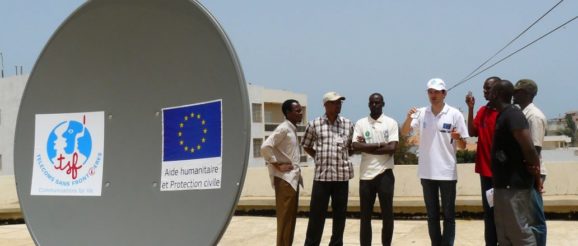Bringing together innovation and humanitarian aid for those who need it most

A piece of paper with a phone number hidden in the shoes of desperate people: that’s how everything started.
It was a piece of paper refugees in the Balkans were showing to Télécoms Sans Frontières’ (TSF) teams along with these words: “When you get back home, promise me you will call this number. Promise me you will call my wife, my daughter, my mother, father, friends and neighbours, and let them know where I am, that I am alive and well”.
That’s why, 20 years ago, TSF started to develop, adapt and
deploy cuttingedge technological solutions to meet a real need identified
during a humanitarian crisis: the need to regain a voice when a natural or
humanmade disaster took it away. This is what demonstrated that technologies
and telecommunications could make a huge difference in the lives of people
affected by humanitarian crises of all kinds. Throughout the years TSF
activities have now evolved to also support humanitarian coordination,
providing connections to relief workers to enhance and speed up their operations.
From the first satellite phones, to the most recent and portable Internet-based
solutions adapted to different environments, TSF supported affected populations
and humanitarian actors in a wide range of crises.
Changing needs required constantly evolving technical solutions. Since its early days, TSF has always started from a need and adapted existing technologies, or developed in-house ones when existing ones where not available, accordingly. This was the case for the Telephony over IP (ToIP) solutions, highly cost-efficient and rapidly deployable telecommunication system merging the use of analogue handsets and the efficiency of IPbased communications. This solution has been developed by TSF technicians and deployed for the first time in Brazil to offer Venezuelan migrants the possibility to reconnect with their relatives.

Migrants in Central America also benefited from another
tailored solution, a low bandwidth, remotely manageable information display
system to provide them vital information along the Central American migratory
route. Among many other solutions, TSF teams also developed the mLearning kit,
consisting of android tablets, a low-consumption server with digital
educational content (Raspberry Pi), a laptop and a Wi-Fi router, to provide
refugee children with educational opportunities even without Internet
connectivity. The adaptation of tailored technical solutions and the
integration of the technical and humanitarian worlds, have been among TSF’s
core strengths. Since the foundation, TSF never stopped to demonstrate,
especially to those not directly involved in field operations, that
technologies in the humanitarian sector were not a luxury but an essential
lifeline, as important as food, medicines or shelter.
TSF’s efforts brought engineers, technicians and programmers closer to the humanitarian sector and brought together private companies from different technological industries, to respond to the same needs. And even more, they developed very special relationships with them, which goes far beyond financial support. Loyal and committed partners who fully share TSF’s vision and actions and are always available to go the extra mile to help provide the best and most effective possible assistance to affected populations and humanitarian actors in emergency situations.

It is this strong link with innovation and new technologies
and the solid, long-standing collaboration with the private sector that makes
TSF proud to have participated in the DataCloud Global Congress 2019 and to
present a special award for the best CSR strategy within the DataCloud
industry. This is an important opportunity to continue the collaboration with
the private sector and to always bring the latest and most effective
technological solutions to the benefit of those who need it most.
The post Bringing together innovation and humanitarian aid for those who need it most appeared first on Data Economy.

